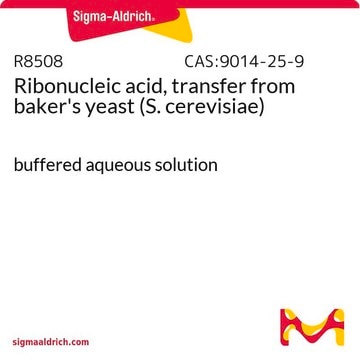SRE0047
Proteinase K from Tritirachium album
Suitable for manufacturing of diagnostic kits and reagents, lyophilized powder, ≥30 units/mg protein, for molecular biology
Synonym(s):
Endopeptidase K
About This Item
Recommended Products
biological source
fungus (Tritirachium album)
Quality Level
grade
for molecular biology
form
lyophilized powder
specific activity
≥30 units/mg protein
mol wt
28.93 kDa
impurities
≤1 ppm DNA
application(s)
diagnostic assay manufacturing
foreign activity
DNAse, Nickase and RNAse, none detected
shipped in
wet ice
storage temp.
−20°C
Looking for similar products? Visit Product Comparison Guide
General description
Application
Removes endotoxins that bind to cationic proteins such as lysozyme and ribonuclease A.
Reported useful for the isolation of hepatic, yeast, and mung bean mitochondria
Determination of enzyme localization on membranes
Treatment of paraffin embedded tissue sections to expose antigen binding sites for antibody labeling.
Digestion of proteins from brain tissue samples for prions in Transmissible Spongiform Encephalopathies (TSE) research.
Biochem/physiol Actions
Unit Definition
Signal Word
Danger
Hazard Statements
Precautionary Statements
Hazard Classifications
Eye Irrit. 2 - Resp. Sens. 1 - Skin Irrit. 2 - STOT SE 3
Target Organs
Respiratory system
Storage Class Code
11 - Combustible Solids
WGK
WGK 1
Flash Point(F)
Not applicable
Flash Point(C)
Not applicable
Certificates of Analysis (COA)
Search for Certificates of Analysis (COA) by entering the products Lot/Batch Number. Lot and Batch Numbers can be found on a product’s label following the words ‘Lot’ or ‘Batch’.
Already Own This Product?
Find documentation for the products that you have recently purchased in the Document Library.
Customers Also Viewed
Articles
Proteinase K aids in molecular biology applications by digesting structural proteins, removing nucleases, and isolating intact genomic DNA.
Proteinase K aids in molecular biology applications by digesting structural proteins, removing nucleases, and isolating intact genomic DNA.
Proteinase K aids in molecular biology applications by digesting structural proteins, removing nucleases, and isolating intact genomic DNA.
Pro K aids in disrupting cell membranes for DNA release, crucial for downstream molecular biology techniques.
Our team of scientists has experience in all areas of research including Life Science, Material Science, Chemical Synthesis, Chromatography, Analytical and many others.
Contact Technical Service









